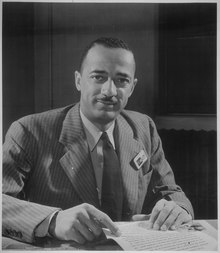William Henry Hastie
| William Hastie | |
|---|---|

Hastie in 1941
|
|
| Judge of the United States Court of Appeals for the Third Circuit | |
|
In office July 22, 1950 – May 31, 1971 |
|
| Preceded by | new seat |
| Succeeded by | James Rosen |
| Governor of the U.S. Virgin Islands | |
|
In office 1946–1949 |
|
| President | Harry S. Truman |
| Preceded by | Charles A. Harwood |
| Succeeded by | Morris Fidanque de Castro |
| Judge of the District Court of the Virgin Islands | |
|
In office March 26, 1937 – 1939 |
|
| Appointed by | Franklin D. Roosevelt |
| Personal details | |
| Born |
November 17, 1904 Knoxville, Tennessee |
| Died | April 14, 1976 (aged 71) East Norriton, Pennsylvania |
| Nationality | United States |
| Alma mater |
Harvard Law School Amherst College |
| Occupation | Lawyer |
William Henry Hastie, Jr. (November 17, 1904 – April 14, 1976) was an American, lawyer, judge, educator, public official, and advocate for the civil rights of African Americans. He was the first African American to serve as Governor of the United States Virgin Islands, as a federal judge, and as a federal appellate judge.
Hastie was born in Knoxville, Tennessee, the son of William Henry Hastie, Sr. and Roberta Childs. His maternal ancestors were African-American and Native American. Family tradition held that one female ancestor was a Malagasy princess. He graduated from Dunbar High School, a top academic school for black students. Hastie attended Amherst College in Massachusetts, where he graduated first in his class, magna cum laude, and Phi Beta Kappa. He received a LL.B. from Harvard Law School in 1930, followed by a S.J.D. from Harvard Law School in 1933.
He was in private practice of law in Washington, DC from 1930 to 1933. From 1933 to 1937 he served as assistant solicitor for the Department of the Interior, advising the agency on racial issues. He had worked with Charles Hamilton Houston, former dean of the Howard University Law School, on setting up a joint law practice.
...
Wikipedia
